Blog Content
14
Jul
2025
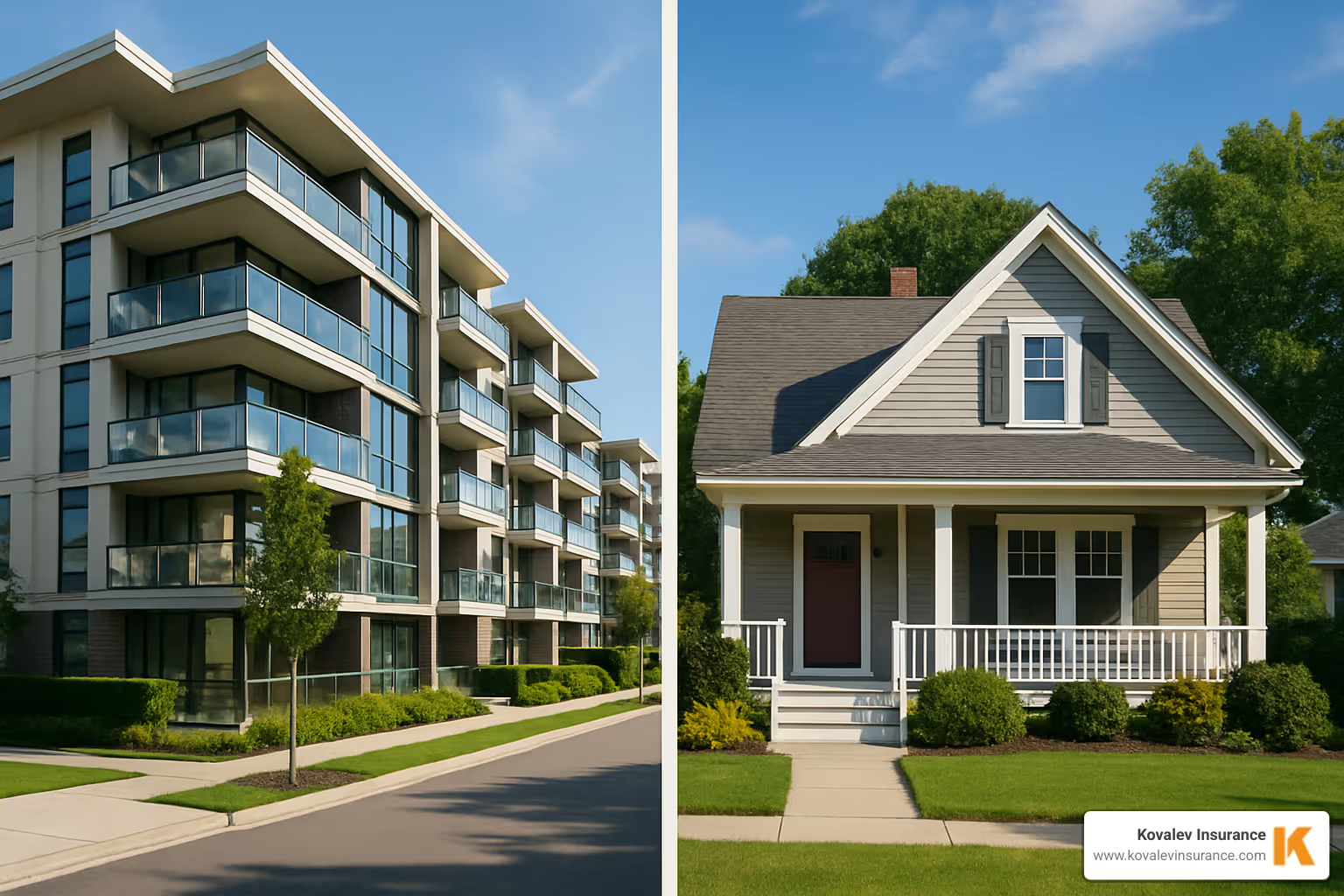
Condo insurance vs homeowners insurance cost can vary dramatically - with condo policies typically running about $531 annually compared to $2,147 for homeowners insurance nationwide. But here in Massachusetts, especially in communities like Newton, Wellesley, and Brookline, the gap can be even wider.
Quick Answer: Condo vs Home Insurance Cost Comparison
The reason for this cost difference isn't just about square footage. When you own a condo in Belmont or Natick, you're only responsible for insuring the interior of your unit and your belongings. The condo association's master policy handles the building structure, roof, and common areas.
But here's what many Massachusetts condo owners miss: Your actual insurance needs depend heavily on your association's master policy type. Some cover everything down to the paint on your walls, while others stop at the bare studs.
As Mikhail Kovalev, I've helped hundreds of Massachusetts property owners steer these coverage decisions over the past decade. My team at Kovalev Insurance Agency has learned that the cheapest policy isn't always the smartest choice.
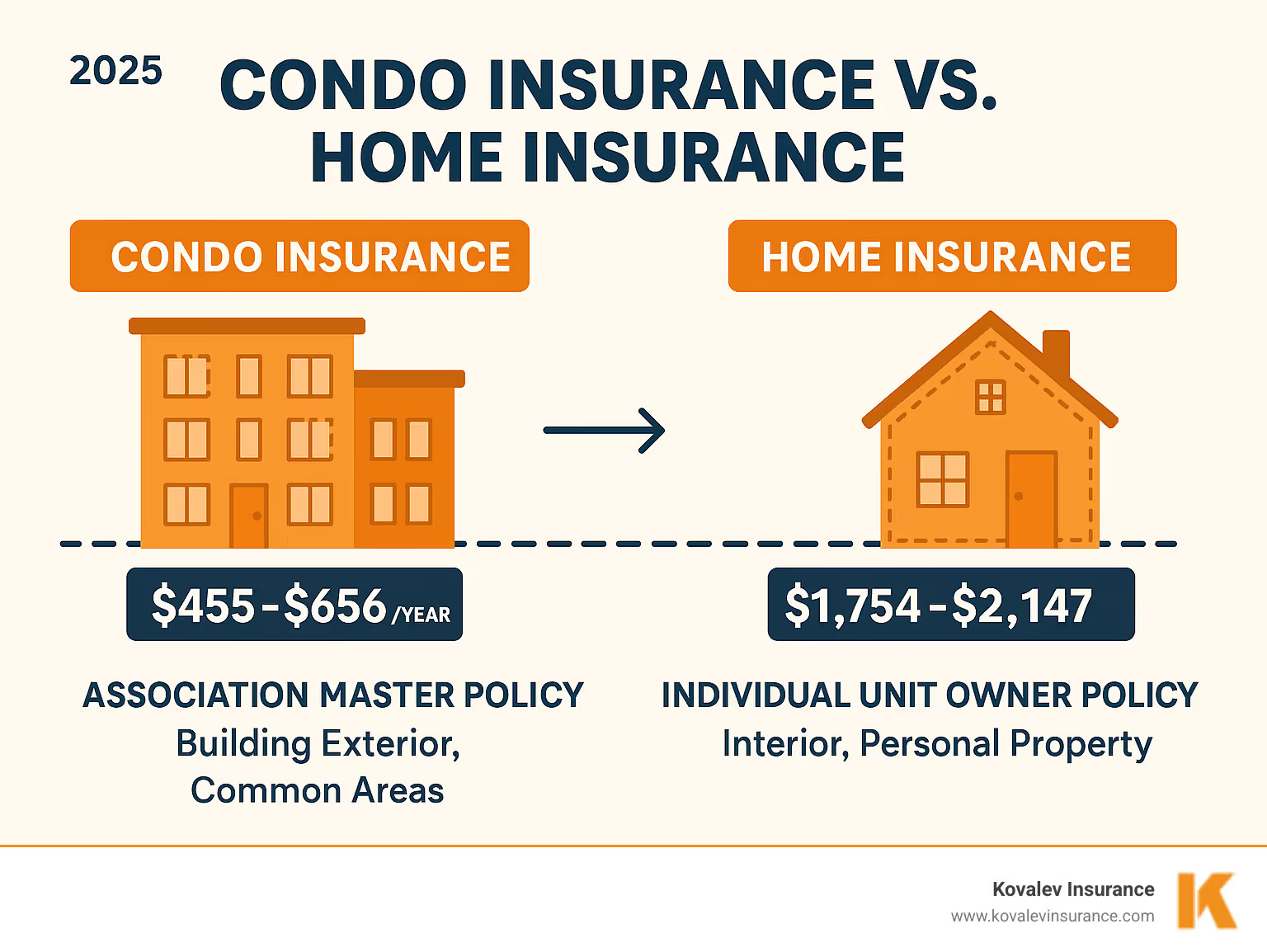
The condo insurance vs homeowners insurance cost difference isn't just about square footage - it's about what you actually own and need to protect. When you buy a house in Newton or Wellesley, you're responsible for everything from the foundation to the roof, plus the land it sits on. But with a condo? You typically own only the interior space of your unit.
This ownership structure creates dramatically different insurance needs and costs. Homeowners insurance (HO-3 policy) must cover the entire building structure, other structures like garages, the land and landscaping, personal property inside, and liability for the entire property.
Condo insurance (HO-6 policies) works differently. You only need to cover interior walls, floors, and ceilings (sometimes), personal belongings, liability within your unit, and improvements and upgrades you've made. The condo association's master policy handles the rest.
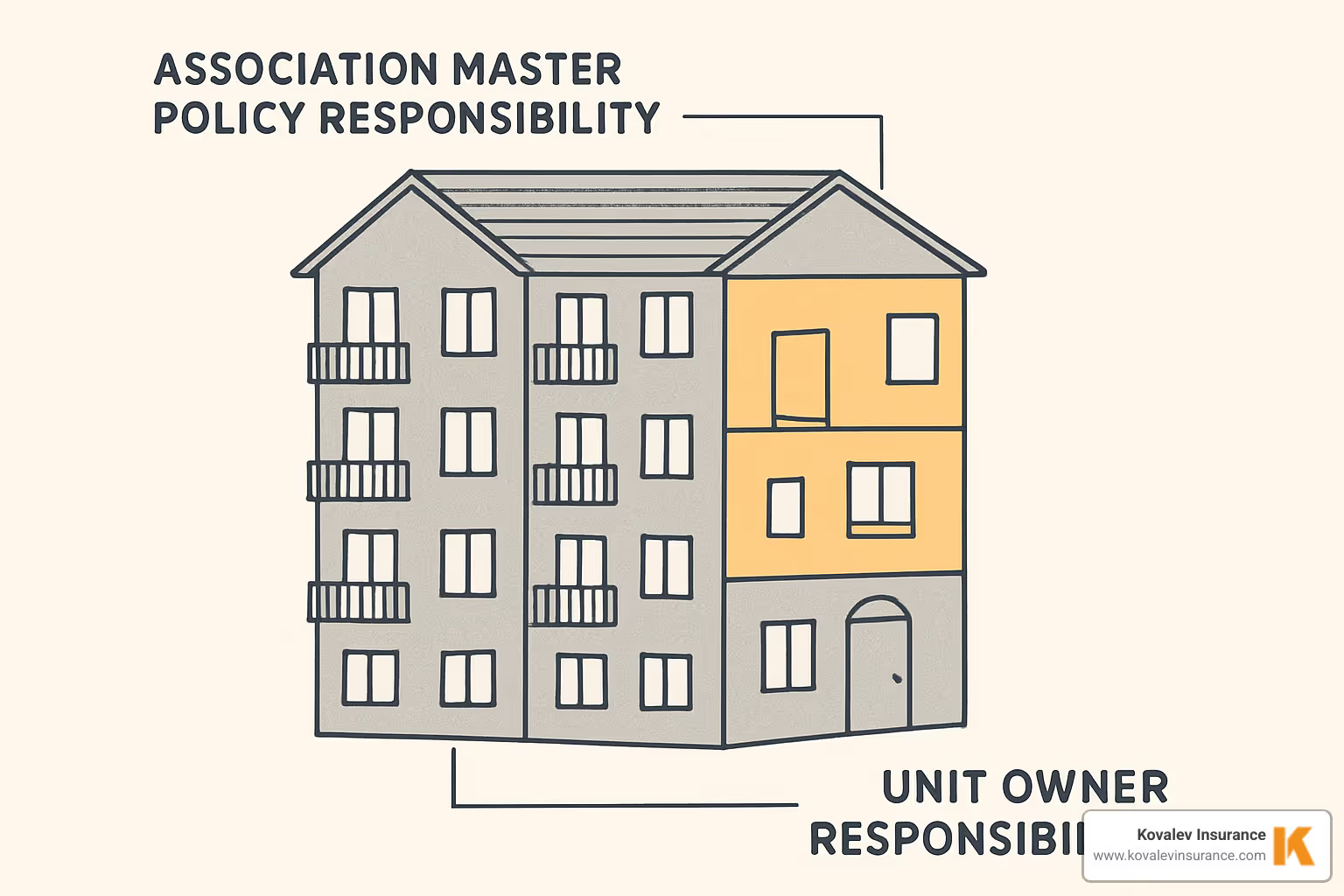
Every condo association in Massachusetts carries a master policy that covers the building's structure and common areas. We see three main types in the Greater Boston area, and each one affects your insurance costs differently.
Bare walls coverage is the most basic type, covering only the building's shell. You're responsible for everything inside your unit, including drywall, flooring, kitchen cabinets, and bathroom fixtures. This requires the most individual coverage and higher premiums.
Single entity coverage covers the building structure plus original fixtures and finishes as they were when the building was first constructed. If you've upgraded your kitchen or bathroom, you'll need additional coverage for those improvements.
All-inclusive coverage is the most comprehensive master policy, covering everything including your upgrades and improvements. This allows for the lowest individual condo insurance premiums.
The master policy also determines how deductibles work. If damage involves your unit, you might be responsible for a portion of the association's deductible through a loss assessment endorsement unless you have proper coverage.
Understanding where the master policy ends and your responsibility begins is crucial for proper coverage. In Massachusetts, we often use the "studs-in" versus "studs-out" analogy to help clients visualize this boundary.
Studs-out coverage means the master policy covers everything up to the wall studs. You're responsible for drywall, paint, flooring, kitchen cabinets, bathroom fixtures, and all personal property.
Studs-in coverage means the master policy covers finished interior surfaces. You typically only need to insure personal belongings and any upgrades beyond the original construction.
Consider this example from a Newton client: They spent $40,000 renovating their kitchen with custom cabinets and granite countertops. Their association had bare walls coverage, meaning they needed $40,000 in additional dwelling coverage to protect their investment.
More info about loss assessment coverage can help you understand how to protect against shared deductibles and special assessments.
When it comes to condo insurance vs homeowners insurance cost in Massachusetts, the difference can be eye-opening. The numbers tell a clear story. While homeowners in our area typically pay between $2,000 and $2,800 annually for insurance, condo owners usually spend just $600 to $800 per year. That's a potential savings of $1,400 to $2,000 every single year.
Massachusetts costs run higher than national averages for both types of coverage due to our coastal location, higher property values, and New England storms.

The national average for condo insurance sits around $455 annually, but here in Massachusetts, we're looking at closer to $600 for basic coverage.
In Newton, most condo owners pay between $650 and $850 each year. Wellesley condo owners typically see annual premiums between $600 and $800. Brookline runs higher at $700 to $950 annually due to density and urban location. Needham offers some of the most affordable condo insurance at $550 to $750 per year. Belmont falls in the middle at $600 to $800 annually, while Natick often provides the best value at $500 to $700 per year.
Your credit score plays a bigger role than many people realize. Massachusetts allows insurance companies to use credit-based scoring, and poor credit can increase your premium by up to 51%.
Condo Insurance MA Average Cost breaks down these local variations in detail.
Homeowners insurance in our area significantly exceeds the national average of $1,754. Most clients with single-family homes pay well over $2,000 annually.
Newton homeowners typically budget $2,200 to $3,500 each year. Wellesley runs slightly lower at $2,000 to $3,200 annually. Brookline homeowners often pay the most at $2,400 to $3,800 annually. Needham offers relatively reasonable rates at $1,900 to $3,000 per year, while Belmont falls in the $2,100 to $3,300 range. Natick provides some of the best value at $1,800 to $2,900 annually.
The age of your home makes a significant difference. Many properties in our area date back to the early 1900s, requiring higher premiums due to outdated systems.
Average Homeowners Insurance Massachusetts provides comprehensive cost breakdowns.
The dramatic difference comes down to what you're actually protecting. Structure coverage represents the biggest difference. Homeowners policies must cover the entire building structure, which typically accounts for 80-90% of the total coverage amount. Condo policies only need to cover interior improvements, usually just 10-20% of the total property value.
Land value plays a huge role in our area, representing 30-50% of a property's total value. Homeowners insurance includes coverage for this land, while condo policies don't need this protection.
According to the Dwelling Fire, Homeowners Owner-Occupied NAIC report, dwelling coverage accounts for about 70% of homeowners insurance premiums but only 15% of condo insurance premiums.
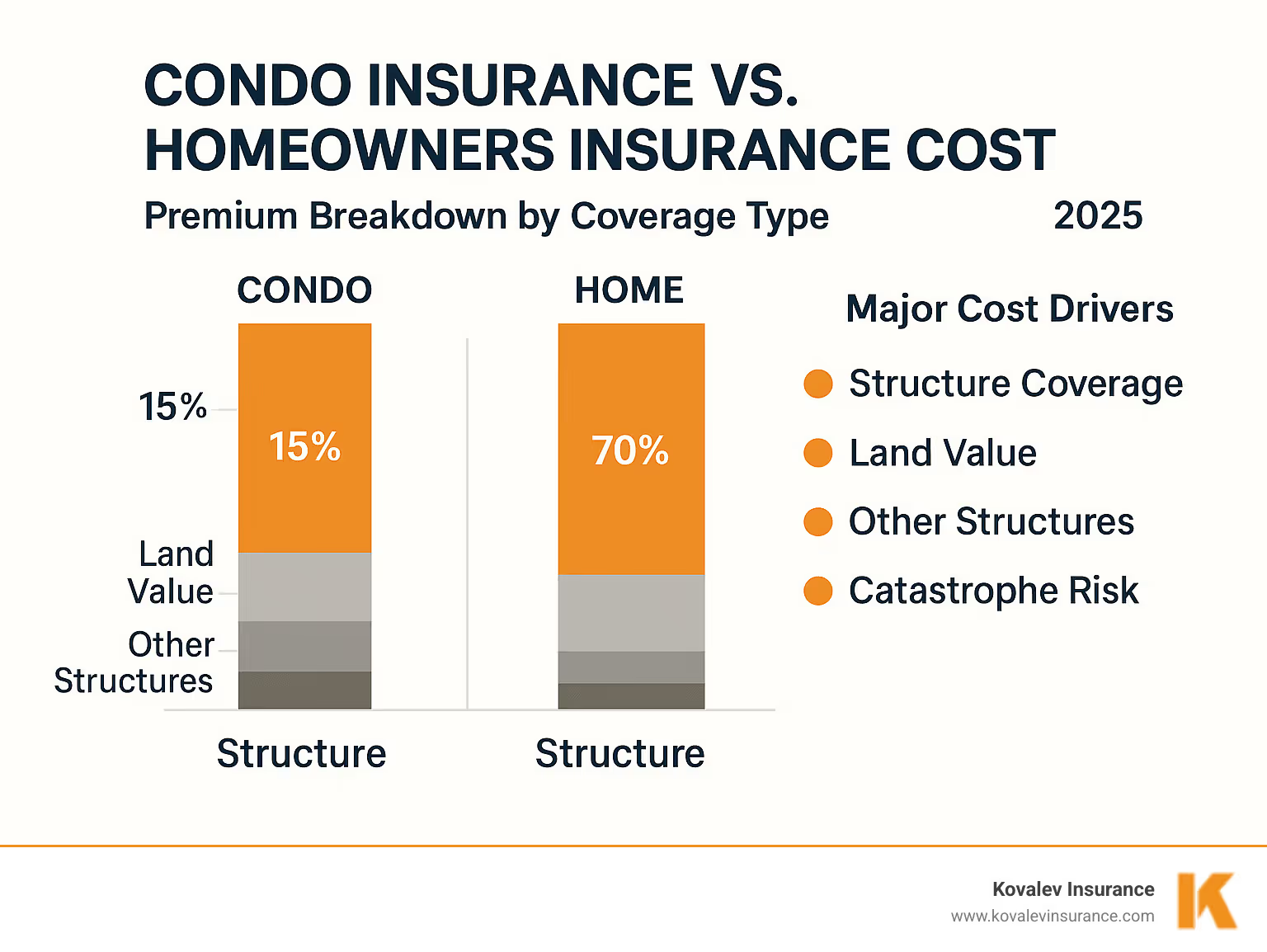
When I sit down with Massachusetts families to discuss their insurance needs, I often see surprised expressions when we talk about what actually drives their premiums. The condo insurance vs homeowners insurance cost differences go far beyond just the type of property you own.
Location plays a huge role. Coastal areas naturally cost more due to wind and potential hurricane damage, while some neighborhoods have higher crime rates that bump up premiums.
Your property's value directly impacts your insurance bill. That beautiful $800,000 condo in Wellesley will cost significantly more to insure than a $400,000 unit in Natick.
Building age matters more than most people realize. Older buildings often have outdated electrical systems, plumbing, or heating that insurance companies view as higher risk.
Your deductible choice is where you can really control costs. Bumping up from a $500 deductible to $2,500 can slash your premiums by 15-25%.
Coverage limits work exactly as you'd expect - higher limits mean higher premiums. We help you find that sweet spot between adequate protection and reasonable cost.
Your credit score has a bigger impact than most people realize. Excellent credit can reduce your premiums by 20-30%, while poor credit can increase them by 50% or more.
Previous claims can affect rates for 3-5 years. We always recommend thinking carefully before filing smaller claims you could handle out of pocket.
Safety devices are an easy win for savings. Smoke alarms, security systems, and fire extinguishers can reduce your premiums by 5-15%.
Bundling your condo or homeowners insurance with auto insurance typically saves 10-25% on both policies.
HOA fees don't directly affect your insurance premiums, but they're worth considering when comparing the total cost of condo versus home ownership.

Nor'easters are probably our biggest weather concern. These powerful winter storms pack a punch with wind and ice damage. Hurricane risk might surprise you - properties within 10 miles of the coast typically pay 10-20% higher premiums. Snow load can damage roofs, especially on older buildings. Flood zones are scattered throughout our communities - standard policies exclude flood damage, so you'll need separate coverage in high-risk areas.
Check this flood map from FEMA to see if your property requires additional flood coverage.
Choosing the right deductibles and coverage limits is like finding the perfect balance between protection and cost. Replacement cost coverage costs 10-20% more than actual cash value coverage, but it pays the full replacement value without depreciation.
Personal property limits usually default to 50-70% of your dwelling coverage, but you can adjust this based on what you actually own. Liability coverage is where I see people make costly mistakes. I recommend $300,000-$500,000 for most clients.
For clients with significant assets, umbrella policies provide additional liability coverage at surprisingly low cost - typically $150-$300 annually for $1 million in coverage.
Condo Insurance Massachusetts Cover provides detailed guidance on selecting appropriate coverage levels.
After helping hundreds of Massachusetts property owners steer condo insurance vs homeowners insurance cost decisions, I've found that the smartest savers aren't just looking for the cheapest policy - they're strategic about how they shop and what coverage they choose.
Shopping multiple quotes remains the single most effective way to save money. We're constantly amazed by the rate differences between carriers for identical coverage. Just last month, we helped a Wellesley condo owner save $340 annually by switching carriers.
Bundling your policies creates immediate savings. When you combine your condo or homeowners insurance with auto coverage, most carriers reward you with discounts on both policies. We typically see savings of 15-20% on each policy.
Raising your deductible is like giving yourself a raise. Moving from a $500 to $1,000 deductible usually saves 10-15% on premiums, while jumping to $2,500 can save 20-25%.
Installing security systems and safety devices not only protects your property but also your wallet. Monitored security systems, updated smoke alarms, and smart water leak detectors can reduce your premiums by 5-15%.
Maintaining a claim-free record requires discipline, but it's worth it. We generally recommend avoiding claims under $2,000 unless you're facing financial hardship.
Group programs through condo associations represent an often-overlooked opportunity. Some associations negotiate group rates that can save 10-20% for all unit owners.
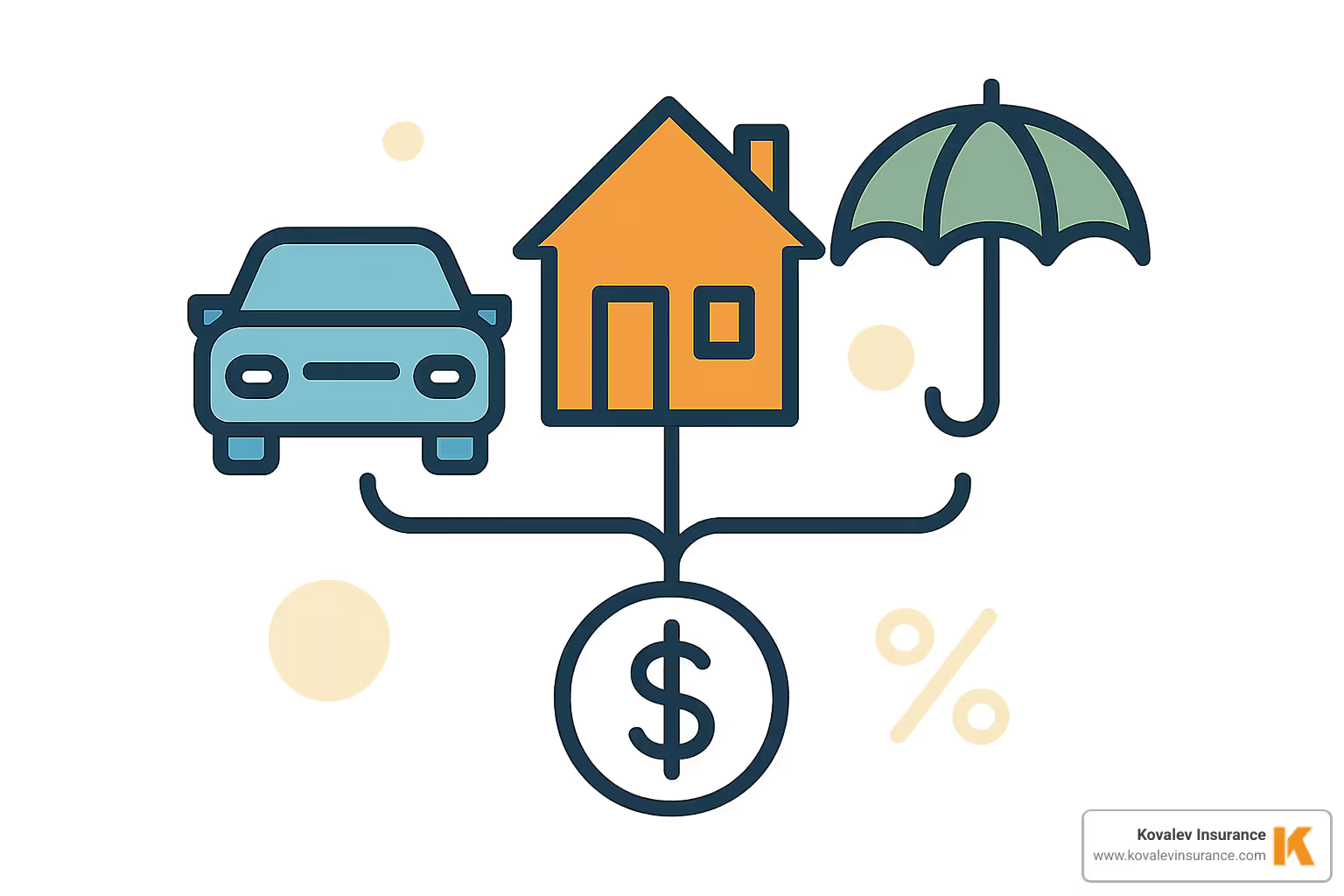
The high property values in Brookline and Belmont make bundling discounts particularly valuable. Multi-policy discounts work especially well in these communities because both auto and property insurance premiums tend to be higher. We've seen clients save $600-1,000 annually by bundling.
Local carriers often outperform national companies in our area. Regional insurers understand Massachusetts building codes, local weather patterns, and area-specific risks better than companies headquartered across the country.
Best Homeowners Insurance Massachusetts provides detailed comparisons of top carriers and their bundling opportunities.
Condo owners have access to unique cost-saving opportunities that single-family homeowners don't have.
Loss assessment coverage costs only $25-50 annually but can save thousands if your association faces a major claim. When a Natick condo association recently dealt with a $75,000 roof repair after storm damage, unit owners with this coverage avoided a $3,000 special assessment.
Water backup coverage is incredibly affordable - usually around $30 per year - but invaluable in older Massachusetts buildings with aging infrastructure.
Built-in safety features in many condo buildings translate to premium discounts. Sprinkler systems, monitored fire alarms, and secure entry systems all qualify for credits that can reduce your annual premium by 5-15%.
Group association programs represent the biggest hidden opportunity. When entire condo associations negotiate group rates, individual unit owners can save 10-20% compared to individual policies.
Recent research from Latest condo savings research confirms what we see daily: condo owners who actively manage their insurance strategy can save 25-40% compared to those who simply auto-renew their policies each year.
Massachusetts doesn't have a state law requiring condo insurance, but you'll need it whether the state says so or not.
Your mortgage lender will demand it. If you're financing your Newton or Wellesley condo, your lender considers insurance a non-negotiable part of the loan agreement.
Your condo association probably requires it too. Most associations in our area write insurance requirements directly into their bylaws, typically specifying minimum liability and dwelling coverage amounts.
The condo insurance vs homeowners insurance cost difference makes this requirement much easier to handle - you're looking at $600-$800 annually instead of $2,000+ for homeowners coverage.
Your association's master policy deductible can become your personal financial responsibility under certain circumstances.
Here's how it works: If your dishwasher malfunctions and floods your unit, causing water damage that requires the association to file a claim, and you're found at fault, you could be on the hook for the entire deductible amount.
Association deductibles in our area typically range from $10,000 to $100,000. Loss assessment coverage is your protection. Standard condo policies include $1,000-$2,000 in loss assessment coverage, but you can increase this to $50,000 or more for just $25-$100 annually.
Absolutely, and it's one of the smartest upgrades you can make. Actual Cash Value coverage pays depreciated amounts, while Replacement Cost Value pays for a new equivalent.
The premium difference is typically 10-20%. For a typical Massachusetts condo policy costing $700 annually, upgrading to replacement cost might add $70-$140 to your premium.
The condo insurance vs homeowners insurance cost advantage gives you room in your budget to choose better coverage options like replacement cost without approaching homeowners insurance premium levels.
The condo insurance vs homeowners insurance cost difference in Massachusetts isn't just about numbers - it's about making smart financial decisions that protect your family and your investment. After helping hundreds of families in Newton, Wellesley, Brookline, Needham, Belmont, and Natick steer these choices, I've seen how understanding these differences can save thousands of dollars annually while ensuring proper protection.
The math is compelling: condo owners typically save $1,400-$2,000 annually on insurance premiums compared to homeowners in our Greater Boston communities. Your condo insurance averages $600-$800 annually while homeowners insurance averages $2,000-$2,800 annually in the same neighborhoods.
What I've learned from a decade in this business is that your association's master policy type determines your individual coverage needs more than any other factor. Whether you're dealing with bare walls, single entity, or all-inclusive coverage makes a huge difference in what you'll pay and what protection you'll need.
The families who save the most understand that bundling, higher deductibles, and safety devices can reduce premiums significantly. They also recognize that location-specific factors like coastal exposure and building age affect costs in ways that aren't always obvious.

Here's something I tell every client: the cheapest policy isn't always the best value. I've seen too many Massachusetts condo owners find coverage gaps after a loss because they focused solely on price rather than protection.
At Kovalev Insurance, we've built our reputation on helping local families make these decisions with confidence. Our relationships with top-rated carriers and deep understanding of local risks allow us to find the right balance of coverage and cost for your specific situation.
Whether you're buying your first condo in Brookline or considering a move from your Newton home to a Wellesley condo, understanding insurance costs should be part of your decision-making process. The potential savings are significant, but only if you maintain adequate protection for your family's needs.
Ready to explore your options? Let's have a conversation about your specific property, location, and coverage needs. We'll review your association's master policy, identify potential gaps, and find the most cost-effective solution that gives you peace of mind.
Massachusetts Home Insurance provides additional resources for understanding local insurance markets and making informed coverage decisions that protect what matters most to your family.
X